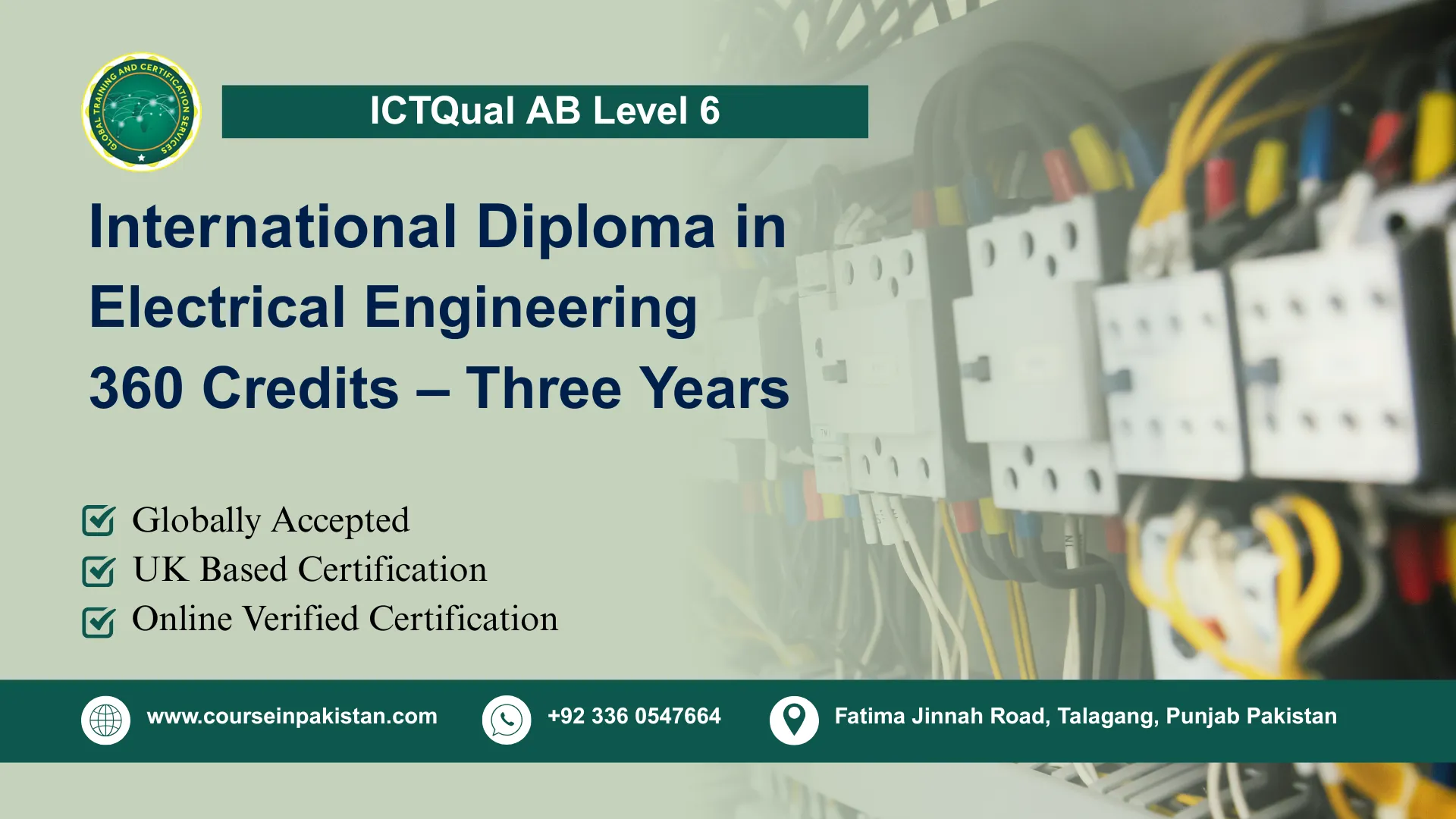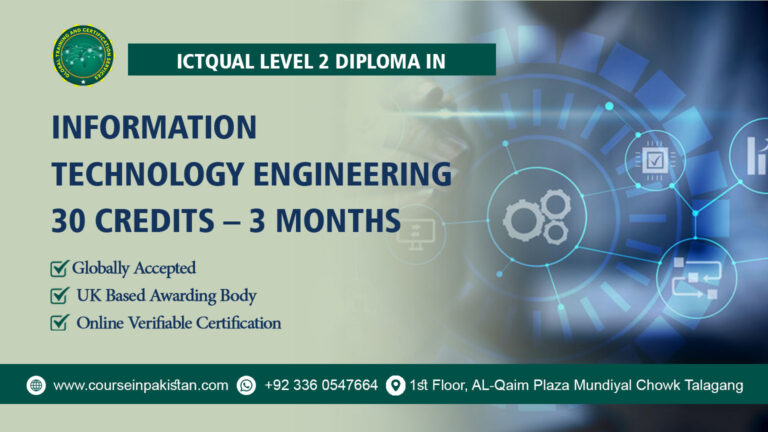
The ICTQual Level 6 Diploma in Electrical Engineering 360 Credits – Three Years is a comprehensive, globally recognized qualification designed to equip learners with advanced technical knowledge and practical skills in electrical engineering. This diploma is structured for both fresh graduates seeking to enter the field and experienced professionals aiming to formalize their expertise. With a fully assignment-based approach, learners can study at their own pace from anywhere in the world, making it flexible and accessible for diverse learners.
This three-year program covers a wide range of subjects including electrical systems, power generation, electronics, control systems, and renewable energy technologies. Learners gain the ability to design, analyze, and maintain complex electrical systems while adhering to industry standards and safety regulations. This diploma is British Council verificable, MOFA and Embassy attestable, and provides strong credentials for employment and iqama approval in various regions.
Whether you are starting fresh or have substantial industry experience, this qualification allows you to progress at your own speed. Experienced professionals with at least 6 years of relevant work experience can complete the certification in a shorter period by demonstrating their expertise in professional discussion meetings with an ICTQual AB Approved Assessor, bypassing the requirement to complete all mandatory assessments.
Course Overview
The ICTQual Level 6 Diploma in Electrical Engineering is a 360-credit, assignment-based program designed to develop advanced technical knowledge and practical skills in electrical engineering. Learners gain expertise in electrical systems, power generation, electronics, automation, control systems, and renewable energy technologies. The program is fully flexible, allowing students to study at their own pace from anywhere in the world, making it ideal for both fresh graduates and experienced professionals. This qualification is British Council verificable, MOFA and Embassy attestable, and supports career advancement, job opportunities, and iqama approval. Experienced professionals with at least six years of relevant experience can complete the certification in a shorter period by demonstrating their knowledge in professional discussion meetings with an ICTQual AB Approved Assessor, bypassing the need to complete all mandatory assessments.
Key Highlights of the Course:
- Flexible Study – Complete assignments at your own pace from anywhere in the world.
- Globally Recognized – British Council verificable, MOFA and Embassy attestable.
- Industry-Oriented Curriculum – Covers electrical systems, automation, electronics, and renewable energy technologies.
- Career and Iqama Approval – Ideal for job opportunities and professional recognition globally.
- Experience-Based Fast-Track Option – Experienced professionals can complete the course in shorter time via professional assessment.
Course Benefits
Comprehensive Knowledge Acquisition
- Understand advanced electrical engineering principles and systems.
- Gain practical skills in design, installation, and maintenance of electrical equipment.
Career Advancement
- Enhance employability in electrical engineering, energy, automation, and industrial sectors.
- Qualify for supervisory, managerial, and technical leadership roles.
Global Recognition
- Obtain a qualification that is British Council verificable, MOFA and Embassy attestable, increasing international credibility.
- Boost eligibility for iqama approval and overseas employment.
Practical and Professional Skills
- Develop expertise in project management, troubleshooting, and real-world engineering applications.
- Gain competency in advanced electrical systems, including renewable energy integration.
Flexible Learning
- Study fully via assignment-based modules at your own pace.
- Experienced candidates can leverage work experience for fast-track certification.
Course Study Units
This qualification, the ICTQual Level 6 Diploma in Electrical Engineering 360 Credits – Three Years, consists of 36 mandatory units.
Year 1: Foundational Knowledge
- Engineering Mathematics I
- Fundamentals of Electrical Circuits
- Principles of Electronics
- Digital Logic Design
- Electrical Machines and Transformers
- Introduction to Control Systems
- Engineering Drawing and CAD
- Introduction to Microprocessors and Microcontrollers
- Electrical Measurement and Instrumentation
- Physics for Engineers
- Health and Safety in Engineering
- Sustainability in Electrical Engineering
Year 2: Intermediate Proficiency
- Engineering Mathematics II
- Power Systems Analysis
- Analog Electronics
- Embedded Systems and Applications
- Electrical Energy Systems
- Signals and Systems
- Principles of Automation and Robotics
- Industrial Electronics
- Communication Systems Engineering
- Renewable Energy Technologies
- Electrical Project Management
- Technical Report Writing and Research Methods
Year 3: Advanced Specialization and Application
- Advanced Power Electronics
- Smart Grid Technology
- Electrical Machine Design
- Advanced Control Systems
- High Voltage Engineering
- Instrumentation and Process Control
- Advanced Embedded Systems
- Energy Storage and Conversion Systems
- Wireless and Optical Communication
- Electromagnetic Compatibility
- Capstone Project
- Professional Development and Ethical Practices
Learning Outcomes
Year 1: Foundational Knowledge
Engineering Mathematics I
- Apply calculus, algebra, and linear equations to solve engineering problems.
- Analyze mathematical models relevant to electrical engineering applications.
Fundamentals of Electrical Circuits
- Understand and apply Ohm’s Law, Kirchhoff’s Laws, and basic circuit theory.
- Analyze DC and AC circuits using standard methods and techniques.
Principles of Electronics
- Identify and operate semiconductor devices such as diodes and transistors.
- Understand electronic circuits and their applications in engineering systems.
Digital Logic Design
- Design and implement basic combinational and sequential logic circuits.
- Apply binary systems, logic gates, and flip-flops to practical problems.
Electrical Machines and Transformers
- Understand the operation of DC and AC machines.
- Analyze transformer principles, performance, and applications.
Introduction to Control Systems
- Understand basic control system concepts and feedback mechanisms.
- Model and analyze simple electrical control systems.
Engineering Drawing and CAD
- Create technical drawings using standard conventions.
- Apply CAD software to design and document electrical components and systems.
Introduction to Microprocessors and Microcontrollers
- Understand architecture and operation of microprocessors and microcontrollers.
- Implement basic programming and interfacing tasks.
Electrical Measurement and Instrumentation
- Use measuring instruments for voltage, current, and resistance accurately.
- Understand the principles of sensors and transducers in electrical engineering.
Physics for Engineers
- Apply principles of mechanics, electromagnetism, and thermodynamics to engineering problems.
- Solve practical engineering problems using fundamental physics concepts.
Health and Safety in Engineering
- Identify workplace hazards and implement safety measures.
- Understand safety regulations and risk assessment in electrical engineering contexts.
Sustainability in Electrical Engineering
- Understand sustainable practices in energy production and electrical systems.
- Apply environmental and energy-efficient solutions in engineering projects.
Year 2: Intermediate Proficiency
Engineering Mathematics II
- Apply advanced mathematical techniques including differential equations and Laplace transforms.
- Solve engineering problems using complex mathematical modeling.
Power Systems Analysis
- Analyze electrical power generation, transmission, and distribution systems.
- Apply load flow and fault analysis in power networks.
Analog Electronics
- Design and analyze analog circuits including amplifiers and filters.
- Understand operational amplifiers and their applications.
Embedded Systems and Applications
- Design basic embedded systems for engineering applications.
- Program microcontrollers to interface with sensors and actuators.
Electrical Energy Systems
- Understand conventional and renewable energy generation and distribution.
- Analyze energy systems for efficiency and reliability.
Signals and Systems
- Analyze continuous and discrete-time signals using mathematical tools.
- Apply Fourier and Laplace transforms to signal processing problems.
Principles of Automation and Robotics
- Understand automation systems and industrial robotics.
- Apply sensors and actuators in automated systems.
Industrial Electronics
- Design and analyze power electronics circuits for industrial applications.
- Understand motor drives and industrial control systems.
Communication Systems Engineering
- Understand principles of analog and digital communication systems.
- Analyze modulation, demodulation, and signal transmission.
Renewable Energy Technologies
- Understand solar, wind, and other renewable energy systems.
- Evaluate performance and integration of renewable energy into power systems.
Electrical Project Management
- Plan, execute, and manage electrical engineering projects.
- Apply project management tools and techniques in engineering contexts.
Technical Report Writing and Research Methods
- Conduct research and document findings effectively.
- Prepare professional technical reports for engineering projects.
Year 3: Advanced Specialization and Application
Advanced Power Electronics
- Design and analyze converters, inverters, and power control circuits.
- Apply power electronics in industrial and renewable energy systems.
Smart Grid Technology
- Understand smart grid concepts and architecture.
- Analyze integration of advanced monitoring and control in power systems.
Electrical Machine Design
- Design electrical machines for specific applications.
- Analyze performance, efficiency, and reliability of machine designs.
Advanced Control Systems
- Apply control theory to complex electrical systems.
- Design feedback controllers for stability and performance optimization.
High Voltage Engineering
- Understand insulation, breakdown, and testing of high voltage systems.
- Apply safety standards in high voltage engineering environments.
Instrumentation and Process Control
- Design and implement measurement and control systems.
- Apply sensors, controllers, and actuators in process automation.
Advanced Embedded Systems
- Develop embedded systems for complex industrial applications.
- Integrate real-time processing, communication, and control functionalities.
Energy Storage and Conversion Systems
- Understand battery, capacitor, and other energy storage technologies.
- Analyze energy conversion systems for efficiency and sustainability.
Wireless and Optical Communication
- Understand wireless transmission and optical communication principles.
- Analyze system performance and signal integrity.
Electromagnetic Compatibility
- Identify and mitigate electromagnetic interference in electrical systems.
- Apply EMC standards in design and testing of devices.
Capstone Project
- Integrate knowledge from all units into a practical engineering project.
- Demonstrate problem-solving, design, and analytical skills in a real-world scenario.
Professional Development and Ethical Practices
- Understand professional ethics and responsibilities in electrical engineering.
- Develop skills for career growth, leadership, and continuous learning.
Who is This Course For?
Fresh Graduates
- Students with a background in science, mathematics, or basic engineering looking to specialize in electrical engineering.
- Individuals seeking flexible, assignment-based study that can be completed at their own pace.
Experienced Professionals
- Electrical or electronics engineers with at least 6 years of verifiable experience seeking formal recognition.
- Professionals aiming to enhance their technical knowledge, leadership, and project management skills in electrical engineering.
Career-Oriented Learners
- Individuals aspiring to work in electrical systems, power generation, automation, renewable energy, or electronics industries.
- Learners interested in professional development and international accreditation for job and iqama approval.
Future Progression
- Advanced positions in electrical engineering, electronics, and automation industries.
- Leadership roles such as project manager, team leader, or technical supervisor in engineering projects.
- Specialization in renewable energy, smart grids, power electronics, or industrial automation.
- Eligibility for higher studies or professional certifications in electrical engineering and related disciplines.
- Opportunities to work in multinational companies or international projects requiring recognized qualifications.
Academic Pathways:
- Progression to Level 7 diplomas or postgraduate qualifications in electrical, electronics, or engineering.
- Professional certifications in specialized fields such as automation, smart grids, or renewable energy technologies.
- Pathway to research-based programs or Master’s degrees in Electrical Engineering or related engineering management programs.
- Opportunities for cross-disciplinary advancement in industrial engineering, robotics, or mechatronics.
Conclusion
The ICTQual Level 6 Diploma in Electrical Engineering provides a comprehensive and flexible learning path for both fresh graduates and experienced professionals. Covering foundational, intermediate, and advanced aspects of electrical engineering, this 360-credit program equips learners with practical, technical, and managerial skills essential for success in modern electrical and electronics industries. Fully assignment-based and internationally verifiable, the course ensures global recognition, MOFA and Embassy attestable certification, and career advancement opportunities, including job and iqama approval. Experienced professionals can complete the diploma in a shorter timeframe by demonstrating their expertise through professional discussions with ICTQual AB Approved Assessors.






